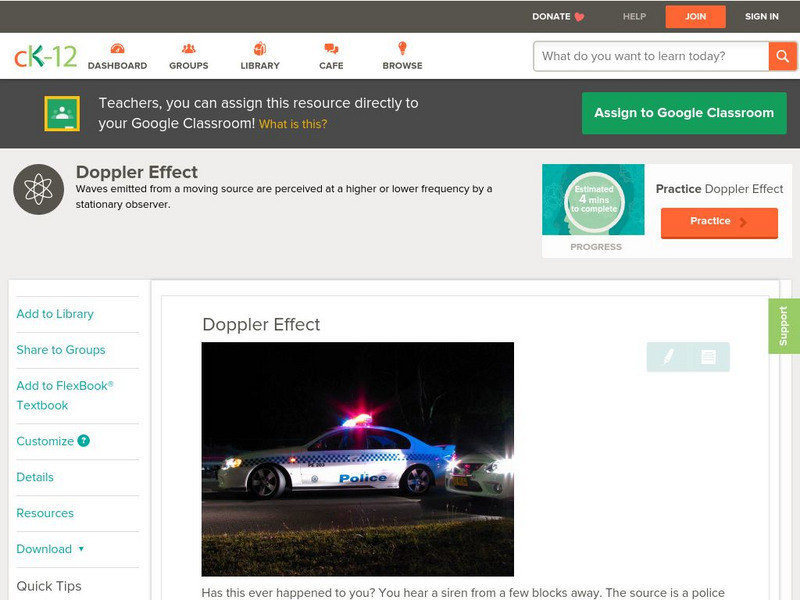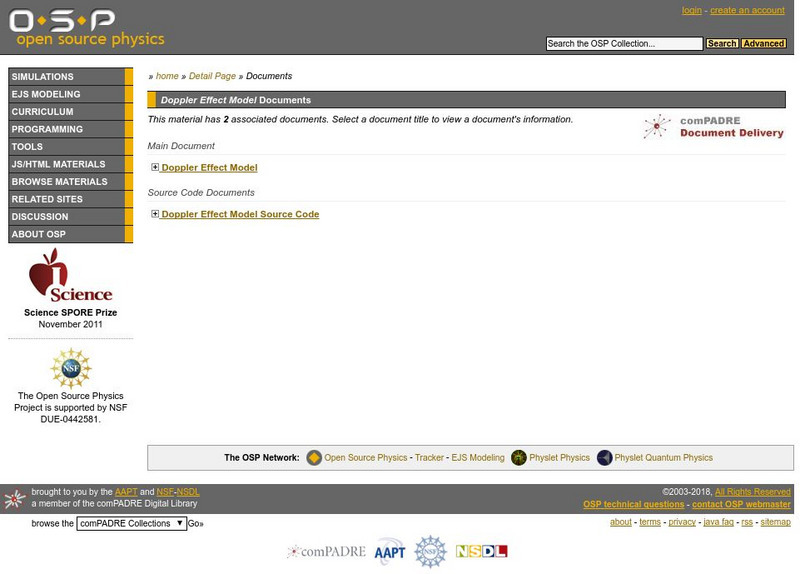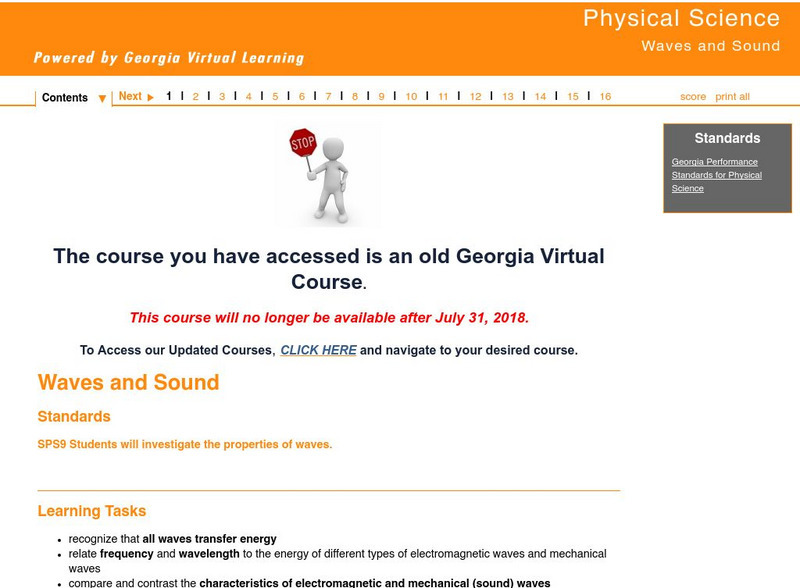Curated OER
20th-Century Astronomy
High schoolers examine and explain how the distance to nearby stars can be measured by the parallax method, discuss the role of women in the history of American astronomy, form their own opinions of the importance of Harlow Shapley and...
Curated OER
Simple Machines: The Wede & Lever
Students describe how wedge and lever makes work easier. For this physics lesson, students analyze experimental data by creating a graph to see the trends. They calculate the work done and mechanical advantage of these simple machines.
Curated OER
Super Gelatin
Students investigate the refraction properties of gelatin to calculate its index of refraction. They discover that as the light travels through the gelatin, its speed and wavelength also change. Students find th indes of refraction of an...
Curated OER
Here It Comes, There It Goes!
Students use an ordinary toy to reveal the Doppler effect. The connection is also made to moving cars, and to the shifting of the lines in the absorption or emission spectrum when the distance between a star and Earth is increasing or...
Curated OER
Waves, Sound, and Light
Ninth graders explain waves in terms of energy transfer and describe their basic types and characteristics. They solve mathematical problems involving wavelength and frequency. Students conduct experiments in reflection and refraction.
Curated OER
Reading the Waves
Students view video segments which reveal the parts of sound and what factors control sound. The viewing and post-viewing activities serve to reinforce the video segments using worksheets and hands-out experiments.
Curated OER
Galaxies
Tenth graders explore the structure and content of galaxies. Through discussion, lab, and hands-on activities, they discover the general structure of the three types of galaxies as well as the effect they have on the structure and...
Curated OER
How Do The Colors of Light Mix?
Students investigate the mixing of light. They form a hypotheses to reason why color changes occur and they write conclusions and ask new questions arising from the investigation. Students identify the primary and complementary colors of...
Curated OER
Galaxy Mapping
Learners research the constellations and discuss their findings. Then they construct their own maps of the galaxy using paper, black paint, aluminum foil, etc. They make a 3-D map of their chosen constellation.
Curated OER
Wind and The Airline
Fifth graders attempt to solve a problem related to an airline accident. The accident appears to be weather related. They analyze and research the effects of wind and turbulence in order to prevent future accidents.
Curated OER
Red Shift, Blue Shift
Middle schoolers demonstrate how stellar spectra measures a star's motion relative to Earth along the line of sight.
Curated OER
Sound Waves; vocabulary review
In this science learning exercise, students locate 28 words in a word search. The focus of the word search is vocabulary connected to the study of sound waves.
Curated OER
E3 Project Instructional Plan: Light
Eleventh graders investigate the nature of light. In this physics lesson, 11th graders determine how light intensity varies with the distance of the light source.
Exploratorium
Exploratorium: Science Snacks: Doppler Effect
Learn about how the Doppler effect explains the change in pitch as a sound source moves in relation to you with this activity. This activity has the students making their own Doppler ball.
Sophia Learning
Sophia: Bill Nye the Science Guy Answers: What Is the Doppler Effect?
The Doppler Effect is used to determine the size of the universe as well as predict the weather. Watch this video to get an idea of just what is happening when we experience this scientific phenomenon. [1 min, 03 sec]
Khan Academy
Khan Academy: Doppler Effect Review
Review key terms and skills for the Doppler effect, including how to interpret wavefront diagrams.
CK-12 Foundation
Ck 12: Physical Science: Doppler Effect
[Free Registration/Login may be required to access all resource tools.] Discusses what the Doppler Effect is and how it occurs.
Utah State University
Uen: Doppler Effect
Students will see and hear demonstrations of the Doppler Effect and then make an advertisement for a rock and roll band called "The Doppler Effect".
American Association of Physics Teachers
Com Padre Digital Library: Open Source Physics: Doppler Effect Model
A simulation of the Doppler Effect, where a change in wave frequency can be observed from the reference frame of the wave source, an observer, or the medium.
Georgia Department of Education
Ga Virtual Learning: Physical Science: Waves and Sound
In this module, students investigate the properties and behavior of different types of waves.
Bill Nye
Bill Nye: My, How Time Flies
In this tutorial, Bill Nye explains how you can use a piece of string and a noisemaker to demonstrate the doppler effect.
CK-12 Foundation
Ck 12: Earth Science: Expansion of the Universe
[Free Registration/Login may be required to access all resource tools.] Recognize how redshift suggests the universe is expanding.
CK-12 Foundation
Ck 12: Physical Science: Wave Frequency
[Free Registration/Login may be required to access all resource tools.] Definition of wave frequency and how it is related to the energy of a wave.
Ducksters
Ducksters: Physics for Kids: Sound Pitch and Acoustics
Kids learn more about the science and physics of sound. Pitch, acoustics, and the doppler effect. How the frequency of the sound wave affects the pitch we hear.






















